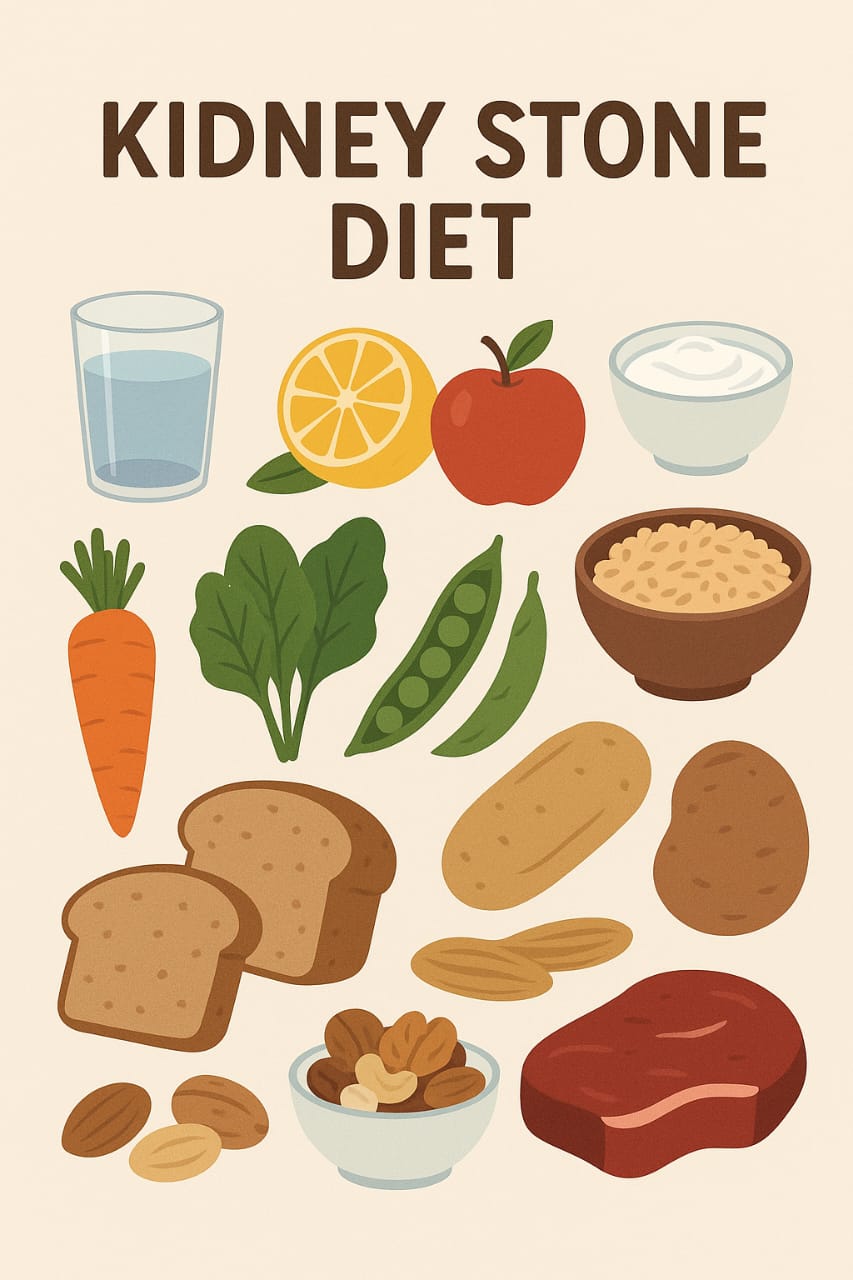
Kidney Stone Prevention Through Diet: What to Eat and What to Avoid
Kidney stones are hard mineral deposits that can cause intense pain and discomfort. While genetics and medical conditions play a role, your diet can significantly influence your risk of developing them. The good news? With a few smart food choices, you can lower your chances of forming stones.
1. Stay Well Hydrated – Your First Line of Defense


- Why it matters: Dehydration makes your urine more concentrated, giving minerals a chance to crystallize into stones.
- Goal: Aim for 2–3 liters of fluid daily (about 8–12 cups), unless your doctor advises otherwise.
- Best choices: Water is best, but lemon water is a bonus—citrate in lemons helps prevent stones.
2. Eat the Right Amount of Calcium
- Myth alert: Cutting calcium entirely can actually increase kidney stone risk.
- Why: Dietary calcium binds to oxalate in your gut, preventing it from being absorbed and forming stones.
- Good sources: Low-fat dairy (milk, yogurt, cheese), fortified plant-based milks, leafy greens (except high-oxalate ones like spinach).
- Daily target: About 1,000–1,200 mg from food, not supplements (unless prescribed).
3. Watch Your Oxalate Intake
- Oxalates are naturally occurring compounds that can combine with calcium to form stones.
- High-oxalate foods to limit: Spinach, beets, rhubarb, nuts, chocolate, sweet potatoes.
- Smart tip: Pair moderate oxalate foods with calcium sources to reduce absorption.
4. Cut Back on Salt
- Why: Excess sodium increases calcium in urine, raising stone risk.
- Tips to lower sodium:
- Avoid processed foods, instant noodles, and salty snacks.
- Limit table salt—try herbs, lemon juice, and spices instead.
- Goal: Keep sodium under 2,300 mg/day (ideally 1,500 mg for higher risk).
5. Limit Animal Protein
- Why: Meat, poultry, eggs, and seafood can increase uric acid levels, which contribute to certain types of stones.
- Better approach: Go for smaller portions and include more plant-based proteins like beans, lentils, and tofu.
6. Watch Added Sugar and Sugary Drinks
- Why: Sugar spikes insulin, affects calcium handling in the kidneys, and sweetened drinks (especially colas) can raise stone risk.
- Best swap: Choose water, herbal tea, or fruit-infused water instead.
7. Foods That Can Help Prevent Stones
- Citrus fruits (lemons, oranges, grapefruit) – citrate helps block stone formation.
- Leafy greens low in oxalates (kale, bok choy).
- Whole grains and high-fiber foods – help regulate urinary pH.
Key Takeaways
- Drink plenty of water and add citrus when possible.
- Balance calcium intake from foods, not just supplements.
- Limit sodium, animal protein, high-oxalate foods, and added sugars.
A sample 1-day kidney stone prevention diet plan based on general guidelines for the most common type of stones (calcium oxalate).
Note: This is for general education — your exact needs may differ depending on your stone type, kidney function, and medical history.
Kidney Stone Prevention Diet Plan (Sample Day)
Morning Hydration
- On waking: 1 glass (250 ml) warm water with a squeeze of lemon (for citrate boost).
Breakfast
- Low-fat Greek yogurt (150 g) with:
- ½ cup fresh berries (blueberries, strawberries, raspberries)
- 2 tbsp rolled oats
- Sprinkle of cinnamon
- 1 slice whole-grain toast with light spread of almond butter
- Drink: 1 glass water
Mid-Morning Snack
- 1 small banana
- 8–10 raw carrots or cucumber sticks
- Drink: Water or herbal tea (no added sugar)
Lunch
- Grilled chicken breast (85–100 g)
- Quinoa salad with chopped cucumber, bell pepper, parsley, olive oil, and lemon juice
- Steamed broccoli or kale (low-oxalate greens)
- Drink: Water with lemon
Afternoon Snack
- ½ cup low-fat cottage cheese with pineapple chunks
- Drink: Water or unsweetened coconut water
Evening
- Herbal tea (e.g., chamomile or peppermint)
- Optional: 1 small apple or pear
Dinner
- Baked salmon (rich in omega-3s, moderate protein portion)
- Brown rice or barley
- Steamed zucchini and carrots
- Side salad with olive oil + lemon dressing (no spinach)
- Drink: Water










